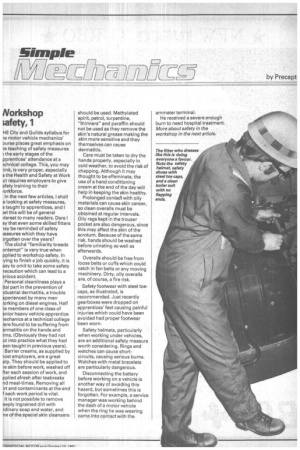Norkshop ;afety, 1
Page 53

If you've noticed an error in this article please click here to report it so we can fix it.
HE City and Guilds syllabus for le motor vehicle mechanics' purse places great emphasis on le teaching of safety measures 1 the early stages of the pprentices' attendance at a .1chnical college. This, you may link, is very proper, especially s the Health and Safety at Work ,ct requires employers to give afety training to their forkforce.
In the next few articles, I shall e looking at safety measures, s taught to apprentices, and I )el this will be of general iterest to many readers. Dare I ay that even some skilled fitters lay be reminded of safety ieasures which they have )rgotten over the years?
The cliché "familiarity breeds ontempt" is very true when pplied to workshop safety. In ying to finish a job quickly, it is asy to omit to take some safety recaution which can lead to a erious accident.
Personal cleanliness plays a ital part in the prevention of idustrial dermatitis, a trouble xperienced by many men forking on diesel engines. Half le members of one class of enior heavy vehicle apprentice lechanics at a technical college fere found to be suffering from ermatitis on the hands and rms. (Obviously they had not ut into practice what they had een taught in previous years).
Barrier creams, as supplied by lost employers, are a great elp. They should be applied to le skin before work, washed off fter each session of work, and pplied afresh after teabreaks rid meal-times. Removing all irt and contaminants at the end f each work period is vital. It is not possible to remove eeply ingrained dirt with rdinary soap and water, and no of the special skin cleansers should be used. Methylated spirit, petrol, turpentine, "thinners" and paraffin should not be used as they remove the skin's natural grease making the skin more sensitive and they themselves can cause dermatitis.
Care must be taken to dry the hands properly, especially in cold weather, to avoid the risk of chapping. Although it may thought to be effeminate, the use of a hand conditioning cream at the end of the day will help in keeping the skin healthy.
Prolonged contact with oily materials can cause skin cancer, so clean overalls must be obtained at regular intervals. Oily rags kept in the trouser pocket are also dangerous, since this may affect the skin of the scrotum. Because of the same risk, hands should be washed before urinating as well as afterwards.
Overalls should be free from loose belts or cuffs which could catch in fan belts or any moving machinery. Dirty, oily overalls are, of course, a fire risk.
Safety footwear with steel toecaps, as illustrated, is recommended. Just recently gearboxes were dropped on apprentices' feet causing painful injuries which could have been avoided had proper footwear been worn.
Safety helmets, particularly when working under vehicles, are an additional safety measure worth considering. Rings and watches can cause shortcircuits, causing serious burns. Watches with metal bracelets are particularly dangerous.
Disconnecting the battery before working on a vehicle is another way of avoiding this hazard, but sometimes this is forgotten. For example, a service manager was working behind the dash of a motor vehicle when the ring he was wearing came into contact with the ammeter terminal.
He received a severe enough burn to need hospital treatment. More about safety in the workshop in the next article.
























































